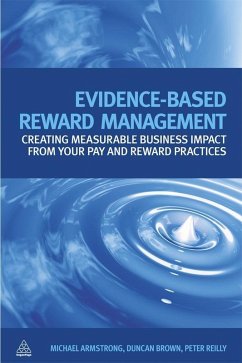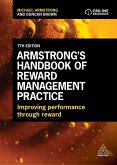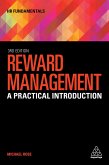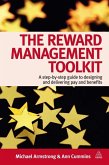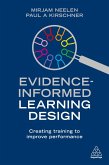Michael Armstrong, Duncan Brown, Peter Reilly
Evidence-Based Reward Management (eBook, ePUB)
Creating Measurable Business Impact from Your Pay and Reward Practices
31,95 €
31,95 €
inkl. MwSt.
Sofort per Download lieferbar

16 °P sammeln
31,95 €
Als Download kaufen

31,95 €
inkl. MwSt.
Sofort per Download lieferbar

16 °P sammeln
Jetzt verschenken
Alle Infos zum eBook verschenken
31,95 €
inkl. MwSt.
Sofort per Download lieferbar
Alle Infos zum eBook verschenken

16 °P sammeln
Michael Armstrong, Duncan Brown, Peter Reilly
Evidence-Based Reward Management (eBook, ePUB)
Creating Measurable Business Impact from Your Pay and Reward Practices
- Format: ePub
- Merkliste
- Auf die Merkliste
- Bewerten Bewerten
- Teilen
- Produkt teilen
- Produkterinnerung
- Produkterinnerung

Bitte loggen Sie sich zunächst in Ihr Kundenkonto ein oder registrieren Sie sich bei
bücher.de, um das eBook-Abo tolino select nutzen zu können.
Hier können Sie sich einloggen
Hier können Sie sich einloggen
Sie sind bereits eingeloggt. Klicken Sie auf 2. tolino select Abo, um fortzufahren.

Bitte loggen Sie sich zunächst in Ihr Kundenkonto ein oder registrieren Sie sich bei bücher.de, um das eBook-Abo tolino select nutzen zu können.
Evidence-Based Reward Management presents an analysis of the current failure of organisations to assess the effectiveness of pay and reward practices. It considers the reasons for this and outlines the damaging consequences of it. By examining recent developments in human capital information and measurement it looks at how HR can construct effective reward for improved performance, both for the individual and organization.
The authors present the tools and techniques which can be applied to practice evidence-based reward management including a 4 step model, which sets strategic goals,…mehr
- Geräte: eReader
- mit Kopierschutz
- eBook Hilfe
- Größe: 3.75MB
- FamilySharing(5)
Andere Kunden interessierten sich auch für
![Evidence-Based Management (eBook, ePUB) Evidence-Based Management (eBook, ePUB)]() Eric BarendsEvidence-Based Management (eBook, ePUB)33,95 €
Eric BarendsEvidence-Based Management (eBook, ePUB)33,95 €![Armstrong's Handbook of Reward Management Practice (eBook, ePUB) Armstrong's Handbook of Reward Management Practice (eBook, ePUB)]() Michael ArmstrongArmstrong's Handbook of Reward Management Practice (eBook, ePUB)40,95 €
Michael ArmstrongArmstrong's Handbook of Reward Management Practice (eBook, ePUB)40,95 €![Reward Management (eBook, ePUB) Reward Management (eBook, ePUB)]() Michael RoseReward Management (eBook, ePUB)18,95 €
Michael RoseReward Management (eBook, ePUB)18,95 €![Reward Management (eBook, ePUB) Reward Management (eBook, ePUB)]() Sarah JonesReward Management (eBook, ePUB)42,95 €
Sarah JonesReward Management (eBook, ePUB)42,95 €![The Reward Management Toolkit (eBook, ePUB) The Reward Management Toolkit (eBook, ePUB)]() Michael ArmstrongThe Reward Management Toolkit (eBook, ePUB)33,95 €
Michael ArmstrongThe Reward Management Toolkit (eBook, ePUB)33,95 €![Armstrong's Essential Skills for People Professionals (eBook, ePUB) Armstrong's Essential Skills for People Professionals (eBook, ePUB)]() Michael ArmstrongArmstrong's Essential Skills for People Professionals (eBook, ePUB)22,95 €
Michael ArmstrongArmstrong's Essential Skills for People Professionals (eBook, ePUB)22,95 €![Evidence-Informed Learning Design (eBook, ePUB) Evidence-Informed Learning Design (eBook, ePUB)]() Mirjam NeelenEvidence-Informed Learning Design (eBook, ePUB)27,95 €
Mirjam NeelenEvidence-Informed Learning Design (eBook, ePUB)27,95 €-
-
-
Evidence-Based Reward Management presents an analysis of the current failure of organisations to assess the effectiveness of pay and reward practices. It considers the reasons for this and outlines the damaging consequences of it. By examining recent developments in human capital information and measurement it looks at how HR can construct effective reward for improved performance, both for the individual and organization.
The authors present the tools and techniques which can be applied to practice evidence-based reward management including a 4 step model, which sets strategic goals, reviews current policies, looks at how to pilot and make changes and improvements and explains how to monitor and adapt on an ongoing basis.
The authors present the tools and techniques which can be applied to practice evidence-based reward management including a 4 step model, which sets strategic goals, reviews current policies, looks at how to pilot and make changes and improvements and explains how to monitor and adapt on an ongoing basis.
Produktdetails
- Produktdetails
- Verlag: Kogan Page eBook
- Seitenzahl: 264
- Erscheinungstermin: 3. Juli 2010
- Englisch
- ISBN-13: 9780749459383
- Artikelnr.: 38401041
- Verlag: Kogan Page eBook
- Seitenzahl: 264
- Erscheinungstermin: 3. Juli 2010
- Englisch
- ISBN-13: 9780749459383
- Artikelnr.: 38401041
- Herstellerkennzeichnung Die Herstellerinformationen sind derzeit nicht verfügbar.
Michael Armstrong is a former Chief Examiner of the CIPD. He has sold over 500,000 books on the subject of HRM (published with Kogan Page). Duncan Brown is director of HR Business Development at the Institute of Employment Studies and was Assistant Director General at the CIPD. Peter Reilly is director of HR Research and Consultancy at the Institute of Employment Studies.
Praise for Evidence-Based Reward Management Introduction 1. The concept of evidence-based management Introduction
Evidence-based management defined
Approaches to evidence-based management
Evidence-based management and research
Evidence-based management and benchmarking
The myth of best practice
Best fit
Evaluation of HR management practices
Evaluation through measurement
Quantitative evaluation
Qualitative evaluation
Chapter summary 2. The concept of evidence-based reward management Introduction
The meaning of evidence-based reward management
The meaning of integrated reward management
The ethical dimension
The role of reward strategy
High-performance working
Engagement
Attraction and retention of talent
Evidence-based reward in practice
Chapter summary 3. The reality of evidence-based reward management Introduction
What is or is not happening?
Why there is little interest in evidence-based reward management
Why is evidence-based reward management important? What evidence-based reward management aims to achieve
Chapter summary
Case study: Kent County Council: effectiveness in building a great place to work 4. The impact of evidence-based HR and reward management Introduction
Measuring the impact of human resource management
Measuring the impact of reward
Chapter summary
Case study: McDonald's restaurants: aligning reward strategy to business objectives through employee engagement 5. The process of evidence-based reward management Introduction
The context: reward practices under scrutiny
The challenges: the questions to answer
Assessing reward effectiveness
The components of evidence-based reward management
Defining reward goals and success criteria
Setting success criteria and moving to assess them
Chapter summary
Case study: an analytical but values-driven approach to managing reward and incentive arrangements at Standard Chartered Bank 6. Reviewing reward Introduction
The process of reward review
Approaches to reward review
Components of a reward review
Internal research
External research
Chapter summary
Case study: DSG International plc: reward effectiveness in driving a business turnaround 7. Measuring and evaluating reward Introduction
Measuring reward
Evaluating reward
Chapter summary
Case study: evidence-based recruitment and reward at the NCPCC 8. Developing and implementing reward Introduction
Analyzing findings and agreeing improvements
Developing new and improved rewards
Developing with implementation in mind
Implementing, operating and reviewing more effective rewards
Chapter summary
Case study: KPMH: delivering effectiveness through performance-related and total rewards 9. Conclusions on evidence-based reward management Introduction
The six components of evidence-based reward
Criteria for assessing reward practices
Views of practitioners
A final word Index
Evidence-based management defined
Approaches to evidence-based management
Evidence-based management and research
Evidence-based management and benchmarking
The myth of best practice
Best fit
Evaluation of HR management practices
Evaluation through measurement
Quantitative evaluation
Qualitative evaluation
Chapter summary 2. The concept of evidence-based reward management Introduction
The meaning of evidence-based reward management
The meaning of integrated reward management
The ethical dimension
The role of reward strategy
High-performance working
Engagement
Attraction and retention of talent
Evidence-based reward in practice
Chapter summary 3. The reality of evidence-based reward management Introduction
What is or is not happening?
Why there is little interest in evidence-based reward management
Why is evidence-based reward management important? What evidence-based reward management aims to achieve
Chapter summary
Case study: Kent County Council: effectiveness in building a great place to work 4. The impact of evidence-based HR and reward management Introduction
Measuring the impact of human resource management
Measuring the impact of reward
Chapter summary
Case study: McDonald's restaurants: aligning reward strategy to business objectives through employee engagement 5. The process of evidence-based reward management Introduction
The context: reward practices under scrutiny
The challenges: the questions to answer
Assessing reward effectiveness
The components of evidence-based reward management
Defining reward goals and success criteria
Setting success criteria and moving to assess them
Chapter summary
Case study: an analytical but values-driven approach to managing reward and incentive arrangements at Standard Chartered Bank 6. Reviewing reward Introduction
The process of reward review
Approaches to reward review
Components of a reward review
Internal research
External research
Chapter summary
Case study: DSG International plc: reward effectiveness in driving a business turnaround 7. Measuring and evaluating reward Introduction
Measuring reward
Evaluating reward
Chapter summary
Case study: evidence-based recruitment and reward at the NCPCC 8. Developing and implementing reward Introduction
Analyzing findings and agreeing improvements
Developing new and improved rewards
Developing with implementation in mind
Implementing, operating and reviewing more effective rewards
Chapter summary
Case study: KPMH: delivering effectiveness through performance-related and total rewards 9. Conclusions on evidence-based reward management Introduction
The six components of evidence-based reward
Criteria for assessing reward practices
Views of practitioners
A final word Index
Praise for Evidence-Based Reward Management Introduction 1. The concept of evidence-based management Introduction
Evidence-based management defined
Approaches to evidence-based management
Evidence-based management and research
Evidence-based management and benchmarking
The myth of best practice
Best fit
Evaluation of HR management practices
Evaluation through measurement
Quantitative evaluation
Qualitative evaluation
Chapter summary 2. The concept of evidence-based reward management Introduction
The meaning of evidence-based reward management
The meaning of integrated reward management
The ethical dimension
The role of reward strategy
High-performance working
Engagement
Attraction and retention of talent
Evidence-based reward in practice
Chapter summary 3. The reality of evidence-based reward management Introduction
What is or is not happening?
Why there is little interest in evidence-based reward management
Why is evidence-based reward management important? What evidence-based reward management aims to achieve
Chapter summary
Case study: Kent County Council: effectiveness in building a great place to work 4. The impact of evidence-based HR and reward management Introduction
Measuring the impact of human resource management
Measuring the impact of reward
Chapter summary
Case study: McDonald's restaurants: aligning reward strategy to business objectives through employee engagement 5. The process of evidence-based reward management Introduction
The context: reward practices under scrutiny
The challenges: the questions to answer
Assessing reward effectiveness
The components of evidence-based reward management
Defining reward goals and success criteria
Setting success criteria and moving to assess them
Chapter summary
Case study: an analytical but values-driven approach to managing reward and incentive arrangements at Standard Chartered Bank 6. Reviewing reward Introduction
The process of reward review
Approaches to reward review
Components of a reward review
Internal research
External research
Chapter summary
Case study: DSG International plc: reward effectiveness in driving a business turnaround 7. Measuring and evaluating reward Introduction
Measuring reward
Evaluating reward
Chapter summary
Case study: evidence-based recruitment and reward at the NCPCC 8. Developing and implementing reward Introduction
Analyzing findings and agreeing improvements
Developing new and improved rewards
Developing with implementation in mind
Implementing, operating and reviewing more effective rewards
Chapter summary
Case study: KPMH: delivering effectiveness through performance-related and total rewards 9. Conclusions on evidence-based reward management Introduction
The six components of evidence-based reward
Criteria for assessing reward practices
Views of practitioners
A final word Index
Evidence-based management defined
Approaches to evidence-based management
Evidence-based management and research
Evidence-based management and benchmarking
The myth of best practice
Best fit
Evaluation of HR management practices
Evaluation through measurement
Quantitative evaluation
Qualitative evaluation
Chapter summary 2. The concept of evidence-based reward management Introduction
The meaning of evidence-based reward management
The meaning of integrated reward management
The ethical dimension
The role of reward strategy
High-performance working
Engagement
Attraction and retention of talent
Evidence-based reward in practice
Chapter summary 3. The reality of evidence-based reward management Introduction
What is or is not happening?
Why there is little interest in evidence-based reward management
Why is evidence-based reward management important? What evidence-based reward management aims to achieve
Chapter summary
Case study: Kent County Council: effectiveness in building a great place to work 4. The impact of evidence-based HR and reward management Introduction
Measuring the impact of human resource management
Measuring the impact of reward
Chapter summary
Case study: McDonald's restaurants: aligning reward strategy to business objectives through employee engagement 5. The process of evidence-based reward management Introduction
The context: reward practices under scrutiny
The challenges: the questions to answer
Assessing reward effectiveness
The components of evidence-based reward management
Defining reward goals and success criteria
Setting success criteria and moving to assess them
Chapter summary
Case study: an analytical but values-driven approach to managing reward and incentive arrangements at Standard Chartered Bank 6. Reviewing reward Introduction
The process of reward review
Approaches to reward review
Components of a reward review
Internal research
External research
Chapter summary
Case study: DSG International plc: reward effectiveness in driving a business turnaround 7. Measuring and evaluating reward Introduction
Measuring reward
Evaluating reward
Chapter summary
Case study: evidence-based recruitment and reward at the NCPCC 8. Developing and implementing reward Introduction
Analyzing findings and agreeing improvements
Developing new and improved rewards
Developing with implementation in mind
Implementing, operating and reviewing more effective rewards
Chapter summary
Case study: KPMH: delivering effectiveness through performance-related and total rewards 9. Conclusions on evidence-based reward management Introduction
The six components of evidence-based reward
Criteria for assessing reward practices
Views of practitioners
A final word Index
